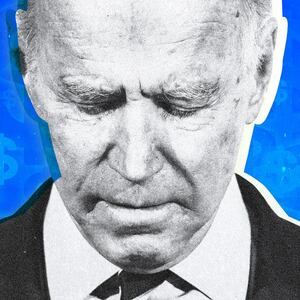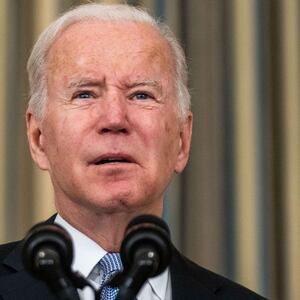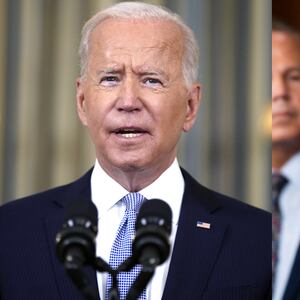There’s no good way for President Joe Biden and Democrats to talk about how they are handling the worsening inflation currently squeezing consumers.
But that hasn’t stopped them from trying.
For months, Democrats have jumped from arguing that inflation was “transitory” and would pass to acknowledging the widespread public pain as prices rise from the gas pump to the grocery store.
Apparently, the public is unmoved. Biden’s approval rating has hit new lows in recent public opinion polls, which have also shown Republicans gaining a clear edge to reclaim Congress in the 2022 elections. Meanwhile, inflation has quickly become the top concern of voters. A new poll from Democratic polling shop Navigator Research found that 92 percent of Americans are concerned inflation will get worse in coming months.
The problems for Democrats don’t end there. Inflation concerns are now endangering their chances of passing a $1.75 trillion social spending bill, titled the Build Back Better Act. That’s because centrist Sen. Joe Manchin (D-WV), whose vote Democrats can’t afford to lose, has begun to hit the panic button and says he is concerned about approving more federal spending in this economic environment.
So with their agenda and political future hanging in the balance, Democrats are trying out a new message to spin themselves out of the mess, casting passage of the Build Back Better Act as the answer to inflation.
As the House draws closer to a vote on the bill, the White House and Democratic lawmakers have blasted out press releases and tweets claiming the bill—which aims to make expensive services like health care and childcare much cheaper, plus extend a monthly cash benefit to families—will ease the pain of inflation.
This assertion largely rests on a White House-approved letter written by 17 Nobel Prize-winning economists saying so, a credential that’s been repeated so many times that it’s becoming the butt of jokes on Capitol Hill.
“So you have 17 Nobel Prize-winning economists saying it’s OK—people pumping their gas don’t care,” one House Democratic aide told The Daily Beast. “They don’t care what Jack Lew and Robert Reich say.”
The president has, in fairness, pointedly emphasized the purported long-term benefits on inflation in “kitchen table” terms, remarking earlier this month that “if your No. 1 issue is the cost of living, the No. 1 priority should be seeing Congress pass” the Build Back Better Act, declaring that it “lowers your bills for health care, childcare, prescription drugs, and preschool. And families get a tax cut.”
The White House’s position that “Build Back Better” can reduce inflation isn’t new. In August, the administration published a memo by Jared Bernstein, a member of the Council of Economic Advisers, and Ernie Tedeschi, a senior economist on the same council, in which the president’s social spending bill—combined with the recently signed infrastructure package—was called an “antidote to inflationary pressure.”
But with the holiday season basically here, and with the price of consumer goods up by more than 6 percent in the last 12 months, according to the Bureau of Labor Statistics’ Consumer Price Index—its fastest pace in more than three decades—the administration has continued to emphasize its spending package as the ultimate answer, with little mention of how to address the pinch right now.
“Delivering on the President’s Build Back Better agenda is going to help address costs for working families in the short term on key expenses like housing, heath care, and child care, and in the long run it’s going to ease inflationary pressures by making our economy stronger and more productive,” Mike Gwin, the director of rapid response at the White House, said in a statement to The Daily Beast.
He added that Biden knows price increases can have a big impact on families, “and that’s why he’s using every tool at his disposal to address them as quickly as possible.”
“That starts with the work his team is doing to take on the pandemic and untangle our supply chains, it’s bolstered by the historic investment in our infrastructure he just signed, and it’s going to be redoubled by his Build Back Better plan to cut household costs,” Gwin said.
White House National Economic Council Director Brian Deese told ABC’s George Stephanopoulos on Sunday that the inflation concerns underscore why it's so important to move forward with the Build Back Better legislation. “This bill is actually going to address the core costs that American families are facing in child care, in housing, in health care," he said.
Pressed by Stephanopoulos on how to help Americans in the short term, Deese pivoted to the administration’s fight against the pandemic, which the White House has blamed for most of the economy’s problems.
Voters aren’t necessarily convinced, however, that the nation’s rickety recovery is entirely the fault of COVID-19. According to a bruising poll released last week by ABC News and The Washington Post, 70 percent of Americans say the economy is in bad shape, and 55 percent say they disapprove of Biden’s handling of the economy—even as the unemployment rate is at the lowest it’s been since the start of the pandemic and the stock market is at all-time highs.
Despite the economic reality for most Americans, the political reality for Democrats that inflation poses is extremely serious—despite some public indications by White House officials that they’re actually not that concerned. On Tuesday, for example, White House chief of staff Ron Klain retweeted a post by investment guru Charlie Bilello, who noted that U.S. retail sales have hit an all-time high, despite consumer sentiment being at its lowest level in a decade.
“Watch what they do, not what they say,” Bilello wrote.
This strategy might seem like a clever way to solve Democrats’ current puzzle, in which inflation is blunting their political momentum and stalling their ability to pass a bill that might help ease Americans’ pocketbook pains.
But so far, for some experts and aides, the overall argument has proven tougher to buy than gas at $4 per gallon.
“Are Democrats reaching for an argument here? I think they are,” said Howard Gleckman, a senior fellow at the Urban-Brookings Tax Policy Center, a nonpartisan economic think tank. He said the other key point for Democrats—that the legislation won’t contribute to inflation because it doesn’t require taking out much new debt—is far stronger.
“It’s a much better argument to say, ‘this is not going to make inflation worse,’ than to say, ‘this is going to solve the inflation problem,’” Gleckman said. “It’s not sensible policy to say our response to inflation is to give people more money.”
Some Democratic lawmakers are hewing closely to the nuanced take, saying the Build Back Better Act will help to ease inflation in the long-term while not making it actively worse now.
“Will this potentially help on the margins? I do think so, yes,” said Rep. Jared Huffman (D-CA) of the short-term impact. “But I do think some of these social investments will make a difference in the long-term.”
Privately, some Democrats have a blunter assessment of the persuasiveness of the new inflation spin. Some worry that, regardless of the White House carefully casting Build Back Better as an anti-inflationary measure, connecting the two during an inflation crisis will necessarily invite questions about the bill’s impact in the short-term.
It’s a “huge risk” to sell Build Back Better as an anti-inflationary measure at all, a source close to the White House told The Daily Beast. After passage, inflation could easily persist, and Democrats facing tough reelections in 2022 could be vulnerable to GOP attacks that they sold a false bill of goods.
“I think we’re going to faceplant on it,” this source said.
On Sunday, Rep. Tom Emmer (R-MN), chair of the campaign arm for House Republicans, vowed on Fox News that voters will hold Democrats “accountable” for the current economic situation next November. Emmer said the GOP’s plan is to “make sure that the voters know that the Democrats’ policies, their incompetence are responsible for higher prices and lower pay, smaller paychecks, more expensive everything.”
The reality, which Democrats largely acknowledge, is that the root causes of inflation will be hard to address. Prices rise when demand outpaces supply, and economies worldwide are grappling with supply-chain issues as they transition out of 18 months of pandemic mode.
The Biden administration can work to speed the transition, and many Democrats view ending the pandemic as the key to addressing inflation. But there’s a risk that inflation could persist long-term anyway, for reasons that could be out of the control of Biden and Democrats—even though the public will blame them anyway.
Huffman acknowledged this is hardly fodder for concise and clear communication. “It’s not a soundbite kind of answer,” he said. “It doesn’t boil down to 10 seconds.”
Democrats get that this is a complex issue. But they’re also aware that they’ll need a simple and convincing answer come Election Day.
Rep. Madeleine Dean (D-PA) told The Daily Beast that, while lawmakers “have the luxury of studying” inflation, folks facing rising prices don’t often have time to broadly consider what’s causing those increases. That means Democrats need to be “smart about the messaging,” she added.
“People need folks like us who have been legislating around this economic collapse for the last two years to explain it,” she said.
Some Democrats are further trying to differentiate inflation and rising costs in their messaging to constituents. In doing so, blame for costs could shift toward more extrinsic issues like supply chain fumbles and labor shortages instead of recent economic policies, like stimulus checks or quantitative easing.
“My families are not saying to me, ‘I’m really concerned about inflation.’ They’re saying, ‘I’m concerned about costs,’” Congressional Progressive Caucus Chair Pramila Jayapal (D-WA) said.
“And when people are concerned about costs, what you have to do is, if this cost is going up, you’ve got to figure out how to keep these costs down,” the congresswoman added.
Jayapal also insisted on MSNBC on Sunday that “wages have risen at the same time, so the actual impact on families is not as big as whatever the rate of inflation is.” Wages and salaries for private industry employees increased 3.5 percent between June 2020 and June 2021, per the Bureau of Labor Statistics.
But Republicans on Capitol Hill are already calling bull. They believe the left’s attempts to explain away inflation fears won’t stick with voters whose pocketbooks are inevitably running thin.
“If I were a Democrat, I’d try to change the subject too,” Sen. John Cornyn (R-TX) said.
Democrats don’t believe they are changing the subject, but they acknowledge they may have to change the way they talk to the public about inflation in order to avoid coming off as academic or unconcerned with the human impact of the inflation squeeze.
Any effective strategy, said the source close to the White House, has to start by empathizing with the public and acknowledging their pain. But they added Democrats are largely missing an opportunity to focus on the role of big business in inflation and redirect public scrutiny to the corporations that are squeezing consumers.
The White House referred The Daily Beast to remarks by noted economists like Jason Furman, Larry Summers, and—yes—the 17 Nobel Prize winners, all of whom predicted that long-term economic growth from the package would reduce consumer prices.
Huffman told The Daily Beast that Democrats cannot “trivialize or discount” that pain—and they should be honest that it could continue, despite their best efforts and confidence it will not.
“I guess we’re not supposed to use the word ‘transitory’ because someone in the messaging department thought it no longer worked,” he said. “It’s going to last longer than six months, but it’s important to look at things that are driving inflation.”
He added that the Build Back Better legislation awaiting action in the House and Senate was “not going to pour jet fuel into the economy and run up debt and do other things that’d drive inflation higher.”













